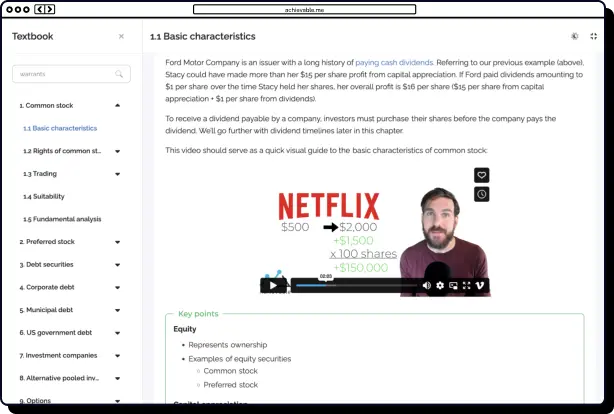
Series 63 pass rate and study tips




Table of contents
- How hard is the Series 63?
- What’s on the Series 63?
- Regulations of Investment Advisers, Including State-Registered and Federal Covered Advisers
- Regulations of Investment Adviser Representatives
- Regulations of Broker-Dealers
- Regulations of Agents of Broker-Dealers
- Regulations of Securities and Issuers
- Remedies and Administrative Provisions
- Communication with Customers and Prospects
- Ethical Practices and Obligations
- Experimental questions
- Tips for studying for the Series 63
- Review exam requirements
- Analyze the content and rate your knowledge
- Develop a structured Series 63 study plan
- Use quality study materials
- Practice makes perfect
- Prepare for exam day
- General advice to prepare for the Series 63
- Read questions carefully
- Find a study technique
- Study time overview
- Series 63 retake policy
- Conclusion
The Series 63 exam, officially called the Uniform Securities Agent State Law Examination, is a mandatory step for those seeking to earn a Series 63 license and sell securities within individual states. The state-issued exam is designed to assess candidates’ knowledge of state securities laws, regulatory frameworks, professional obligations, and ethical standards. Mastery of topics covered in the Series 63, ranging from regulations to investor responsibility, ensures that aspiring securities agents understand their legal duties and responsibilities to clients and the industry.
Although past estimates of Series 63 pass rates may suggest that this exam is easier to conquer than other Financial Industry Regulatory Authority (FINRA) examinations, the test’s complexity is not something to underestimate. Achieving a passing score on the Series 63 requires dedicating ample preparation time to meet state-specific compliance standards.

How hard is the Series 63?
The Series 63 is the standard test aspiring stock brokers and broker-dealers must pass to practice in their chosen state. The exam covers state and federal financial regulations on investment advisors and related professions, securities and issuers, communications and advertising standards, and ethical principles. While official Series 63 pass rates are not published by the North American Securities Administrators Association (NASAA), the test’s governing agency, industry insiders believe the pass rate ranges between 72% and 85%.
In a 2014 study of stockbrokers who took the Series 63, The Wall Street Journal found that 86% passed on their first attempt. This figure is higher than the reported pass rate for other licensing exams like the Series 7, which has a pass rate of around 70%. The exam is shorter compared to other licensing tests at just 60 questions, but the material can be dense and challenging for test takers unfamiliar with state financial regulations. Higher rates of success on the Series 63 could be due to the fact that more experienced securities professionals usually take this exam after passing exams like the Series 7 and the Securities Industry Essentials (SIE). A strong command of financial markets and concepts, as well as state-specific regulations, can help greatly improve your chances of passing the Series 63.
What’s on the Series 63?
The Series 63 exam mainly focuses on state securities regulations and compliance with these rules. The exam consists of 60 scored multiple-choice questions, along with 5 unscored pretest questions, all to be completed within a 75-minute time frame. The test is broken down into the following categories:
Topic | Questions | % of test |
|---|---|---|
Regulations of Investment Advisers, Including State-Registered and Federal Covered Advisers | 3 | 5% |
Regulations of Investment Adviser Representatives | 3 | 5% |
Regulations of Broker-Dealers | 7 | 12% |
Regulations of Agents of Broker-Dealers | 8 | 13% |
Regulations of Securities and Issuers | 5 | 9% |
Remedies and Administrative Provisions | 7 | 11% |
Communication with Customers and Prospects | 12 | 20% |
Ethical Practices and Obligations | 15 | 25% |
Total | 60 | 100% |
Please note that the exact order of questions on your actual test may vary, as FINRA-administered exams randomly select questions from different categories. Here are the concepts covered within each category, which should all be included in a detailed Series 63 study guide:
Regulations of Investment Advisers, Including State-Registered and Federal Covered Advisers
3 questions: 5% of the exam
This brief section includes defining what investment advisors do, the activities requiring registration, and registration exclusions. Investment advisors provide advice, recommendations, and portfolio management services to clients, and have a legal obligation to protect a client’s best interest as fiduciaries.
Regulations of Investment Adviser Representatives
3 questions: 5% of the exam
Questions in this category will ask you about the formal definition of an investment advisor representative (IAR) and activities that require and do not require registration. IARs work for investment advisory companies and provide personalized investment and financial planning advice.
Regulations of Broker-Dealers
7 questions: 12% of the exam
Like the previous sections, this category covers the definition of a broker-dealer and registration and post-registration requirements, but also includes information on broker-dealer agent supervision. Broker-dealers either work independently or as part of a broker-dealer firm to trade securities for their own accounts or on behalf of customers, and are not bound by the same fiduciary duties as investment advisors.
Regulations of Agents of Broker-Dealers
8 questions: 13% of the exam
For these questions, you must know what a broker-dealer agent is, the registration process for agents, and the required registration or uniform forms. Broker-dealers and broker-dealer agents are also called registered representatives or, more commonly, stockbrokers. Broker-dealer agents in particular buy and sell securities on behalf of clients as representatives of a broker-dealer firm.
Pro-tip: Despite the relatively small size of each individual “Regulation of Persons” category (Investment Advisers, IARs, Broker-Dealers, Agents of Broker-Dealers), the content area's total weight is 46%. To ace these questions, a careful review of the roles and responsibilities of various securities professionals is a must.
Regulations of Securities and Issuers
5 questions: 9% of the exam
Questions from this section cover the definition of securities and issuers, state registration and post-registration requirements, exemptions from registration, and state enforcement and anti-fraud authority.
Remedies and Administrative Provisions
7 questions: 11% of the exam
These questions mainly focus on how state securities administrators carry out their supervisory responsibilities, including administrative actions and other penalties and liabilities.
Communication with Customers and Prospects
12 questions: 20% of the exam
This category consists of required product disclosures, unlawful representations concerning broker-dealer agent registration, performance guarantee prohibition, customer agreements, and correspondence and advertising. For customer agreement questions, candidates must know how new accounts are set up, how margin accounts function, and how options are traded. As a whole, these questions make up a significant portion of the test.
Ethical Practices and Obligations
15 questions: 25% of the exam
As one of the most important categories of the exam, Ethical Practices and Obligations covers compensation structures, standards around customer funds and securities, and conflicts of interest, criminal activities, and other ethics issues.
Experimental questions
FINRA/NASAA exams like the Series 63 include a number of unscored, “experimental” questions that will not count toward your final score. The official Series 63 exam you take will be 65 questions, with 5 of those questions used for pretesting purposes. Trial questions are added to the exam at random, so there’s no way of knowing which questions are experimental and which ones count. The best course of action is to answer all items on the exam to avoid missing any official questions. If you feel stuck, remember that there is no penalty for guessing, so answer a question as best you can and move on to the next. By completing all the questions on the exam, you’ll have a better chance of receiving a passing grade.
To earn your license, you must achieve a passing score of 72%, which means correctly answering at least 43 out of the 60 scored questions. Understanding the Series 63 exam structure is crucial for developing a study plan and ensuring success on your first attempt.

Tips for studying for the Series 63
Review exam requirements
Before beginning to study for the Series 63, make sure you meet all of the qualifications and requirements to sit for the exam:
- Age: You must be 18 years old or older.
- Enroll: You must enroll for Series 63 yourself using FINRA’s Test Enrollment Services System (TESS). The Series 63 does not require candidates to be sponsored by a FINRA-registered firm to take the test.
- Exam fee: The exam must be taken at an official Prometric test center near you. When you schedule your exam, you will be asked to pay a $147 fee to complete your registration.
Though you don’t need to have any co-requisite licenses to take the Series 63, this certification is often combined with others to entitle investment professionals the right to practice in their state. If you hold the SIE, Series 6, Series 63, and Series 65 licenses, you are authorized to provide investment advice on mutual funds, investment companies, and variable annuity products. If you have the SIE, Series 7, Series 63, and Series 65 licenses, you are permitted to offer advisory services across nearly all types of securities products. Taking the SIE and the Series 6/7 before you take on the Series 63 will not only open more opportunities but also make tackling the content on the Series 63 easier.
Analyze the content and rate your knowledge
Use the content outline above to review all of the topics covered in the Series 63 at a high level. Take a diagnostic Series 63 practice test and work through practice problems from each category to assess your starting point. Use your results to identify strengths and areas of improvement so you know what to focus on as you prepare. Be sure to track your progress by continuing to use practice tests and other Series 63 study materials.
Develop a structured Series 63 study plan
When it comes to Series 63 preparation, it is important to manage your time effectively. Most candidates spend around 20 to 40 hours preparing for the exam. Different people prepare differently; some individuals can successfully prepare in 25 - 30 hours over two weeks, while others may need 50 hours of focused studying over four weeks. The amount of time you must spend studying will depend on your familiarity with the material and your study habits.
Here are some helpful questions to ask yourself before planning your study schedule: Do you need more time to learn the material or review it? Do you want to split up the material over days or study it all at once? Balance your study plan by focusing on significantly weighted areas where you need the most improvement.
As mentioned above, the exam emphasizes certain areas more heavily than others. This could give you an idea of what you want to focus more on and what you think you may be better at. Concentrate your studies on these sections to maximize your score and use your time efficiently. Achievable makes it easy to plan a study schedule based on your timeline and areas of focus with our dynamic study planner.
Use quality study materials
A solid Series 63 course plan and textbook will include guided instruction, innovative study tools, and plenty of practice questions and exams for review. Use flash cards, Series 63 “dump sheets,” and other study aids for reinforcement of key ideas. Pick a study program packed with resources and backed by a pass guarantee. Achievable’s library of Series 63 resources can help you get a head start on your preparation. You can also explore our tutor directory for personalized Series 63 studying support.
Practice makes perfect
It is always a great idea to practice because it ensures the information enters your long-term memory as a form of active recall. The more practice questions you complete, the better you will grasp what kinds of questions will be on the actual exam. Doing practice exams under realistic conditions and time constraints will also help you with the timing. When you keep practicing, you eventually get faster, which will prevent spending too much time on a question or potentially running out of time. Try aiming for a score above 80% on the practice exams to help gain more confidence.
Prepare for exam day
The night before your Series 63 certification exam, scan over your review materials, address any last-minute concerns, and get a good night’s sleep. Avoid cramming the night or morning before, as this can negatively affect performance. On the day of the exam, don’t forget to bring a valid government ID such as a driver’s license or passport. Arrive at the test center 30 minutes before your scheduled exam time to ensure a smooth check-in process. Stay calm and collected as you progress through the exam: additional stress can lead you to falter or miss important question details, even on topics you have mastered.
General advice to prepare for the Series 63
Read questions carefully
State exams are notorious for throwing in extra information or wording questions in a way to trick you. Make sure to take your time reading the questions to prevent this from happening. It is easy to get tripped up solely because of the wording, even if you know the material. Make sure to analyze each answer choice and use the process of elimination to cross out answers you know are wrong. This will help you narrow down your answers, and you can even use this method to cross out information you do not need in a question.
Find a study technique
Practice using different study techniques to find what suits you best. One study technique that is highly recommended is the Pomodoro Technique. This method consists of studying for 25-minute blocks, followed by 5-minute breaks. Keep the breaks mindful, like going outside or taking a short walk. This will keep your brain moving and will help you retain the information better. After four cycles of this, take a longer break to do something you enjoy before returning to studying. It is worth a try if you find your study technique lacking.
Study time overview
Some individuals take two weeks to prepare, while others take four. It might be helpful to review the material and map out what you really need to focus on, making sure to allocate enough time to review and sleep. Find a sweet spot and make only necessary changes to your study plan based on how you feel.
Series 63 retake policy
The Series 63 can be retaken as many times as needed. After the first two attempts, you can retake the test after 30 days. If you take the exam a third time and do not pass, you must wait 180 calendar days to try again. If you don’t pass the Series 63 at first, use your time between tests to adjust your study priorities and practice.

Conclusion
The Series 63 exam is known for being shorter than other securities licensing exams, but earning your Series 63 license still demands a thorough grasp of state securities regulations and ethical standards. To maximize your chances of achieving a strong Series 63 pass rate, it’s important to dedicate adequate study time, prioritize topics that carry more exam weight, and consistently work through Series 63 practice questions. Understanding the length of time you need to prepare for the Series 63 based on your background and familiarity with the material will help you build an effective plan and increase your confidence on exam day.


